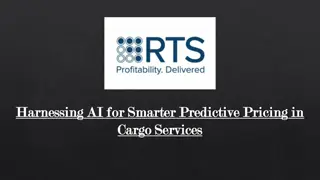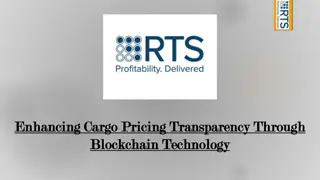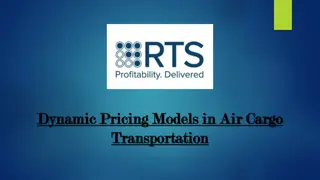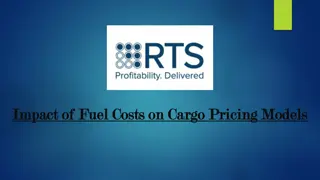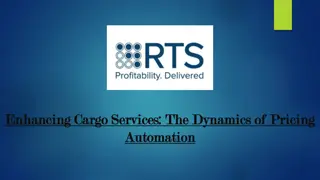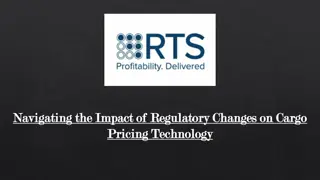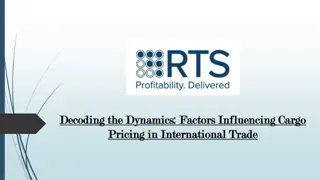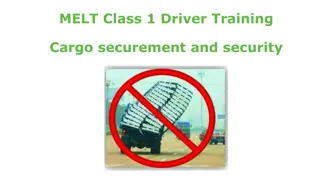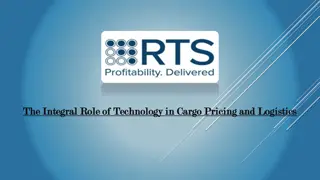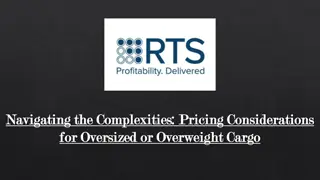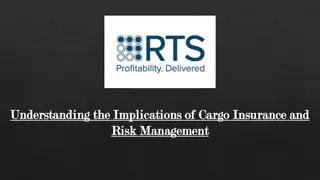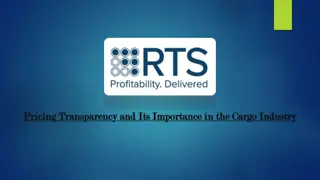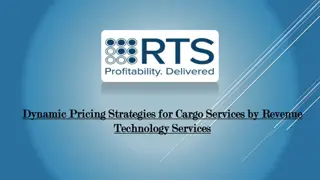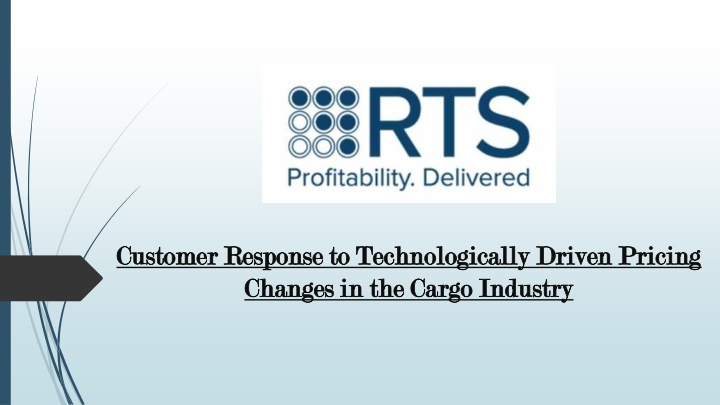
Customer Response to Technologically Driven Pricing Changes in the Cargo Industry
In the fast-paced world of cargo logistics, the introduction of advanced Revenue Technology Services has significantly altered how pricing strategies are formulated and implemented. This technological evolution, especially the adoption of dynamic pricing models, is reshaping customer behavior and expectations in the cargo industry. As businesses strive to stay competitive and profitable, understanding the impact of these technologically driven pricing changes on customer response is crucial.
Download Presentation

Please find below an Image/Link to download the presentation.
The content on the website is provided AS IS for your information and personal use only. It may not be sold, licensed, or shared on other websites without obtaining consent from the author. If you encounter any issues during the download, it is possible that the publisher has removed the file from their server.
You are allowed to download the files provided on this website for personal or commercial use, subject to the condition that they are used lawfully. All files are the property of their respective owners.
The content on the website is provided AS IS for your information and personal use only. It may not be sold, licensed, or shared on other websites without obtaining consent from the author.
E N D
Presentation Transcript
Customer Response to Technologically Driven Pricing Customer Response to Technologically Driven Pricing Changes in the Cargo Industry Changes in the Cargo Industry
In the fast-paced world of cargo logistics, the introduction of advanced Revenue Technology Services has significantly altered how pricing strategies are formulated and implemented. This technological evolution, especially the adoption of dynamic pricing models, is reshaping customer behavior and expectations in the cargo industry. As businesses strive to stay competitive and profitable, understanding the impact of these technologically driven pricing changes on customer response is crucial. The Shift to Dynamic Pricing The Shift to Dynamic Pricing Dynamic pricing, a strategy that allows businesses to adjust prices on the fly based on various market conditions and demand fluctuations, has become increasingly prevalent in the cargo industry. This method contrasts sharply with traditional fixed pricing models, where prices are set in advance and remain consistent regardless of changes in market dynamics. The ability to adapt pricing in real-time enables cargo companies to optimize their revenue and improve resource allocation, but it also introduces a new level of complexity in customer relations
Technological Enablers of Dynamic Pricing Technological Enablers of Dynamic Pricing The backbone of dynamic pricing in the cargo industry is advanced analytics and sophisticated algorithms powered by Revenue Technology Services. These technologies analyze a vast array of data points, including cargo volumes, shipping times, route popularity, seasonal trends, and even geopolitical events, to set optimal prices. The immediate benefit of such dynamic pricing is apparent in maximized cargo space utilization and enhanced profitability. However, the reception of this pricing strategy by customers varies and warrants a closer look. Customer Response and Adaptation Customer Response and Adaptation The response from customers to dynamic pricing in the cargo industry has been mixed. On one hand, some customers appreciate the transparency and the potential cost savings during off-peak times. Small to medium-sized enterprises (SMEs), in particular, can benefit from lower shipping costs when demand is low, making this a favorable option for businesses with flexible shipping schedules. On the other hand, dynamic pricing can lead to unpredictability in costs, which may deter customers who prefer stable and predictable pricing for budgeting and planning. For large companies or those with strict logistical schedules, fluctuations in cargo pricing can complicate operations and financial planning, leading to frustration and the need for more sophisticated forecasting tools.
The Role of Communication and Customer Education The Role of Communication and Customer Education Effective communication and proactive customer education are critical in mitigating the challenges posed by dynamic pricing. Cargo companies need to invest in educating their clients about the benefits and workings of dynamic pricing models. Clear, transparent communication about how prices are determined and what factors influence price changes can help build trust and acceptance among customers. Moreover Moreover, offering predictive pricing tools and detailed analytics can empower customers to make more informed decisions. By providing insights into pricing trends and future rates, cargo companies can help customers plan better and take advantage of lower prices, thereby enhancing customer satisfaction and loyalty. Looking Looking Ahead: The Future of Cargo Pricing Ahead: The Future of Cargo Pricing As technology continues to evolve, the cargo industry must stay ahead of the curve by continuously refining their pricing strategies and technological tools. The future will likely see a more personalized approach to pricing, where machine learning and AI integrate deeper into dynamic pricing systems, allowing for more accurate and individualized pricing solutions based on specific customer needs and behaviors.
In conclusion In conclusion, while dynamic pricing presents numerous advantages for both cargo companies and their customers, its success largely depends on how well customers understand and adapt to these changes. By focusing on customer education and transparent communication, businesses can harness the full potential of Revenue Technology Services to foster a more flexible, responsive, and ultimately profitable cargo industry. As we move forward, those who can best align technological capabilities with customer satisfaction will lead the industry into a new era of logistics management.

